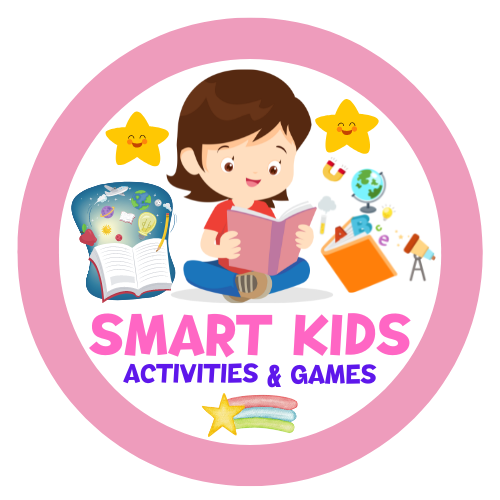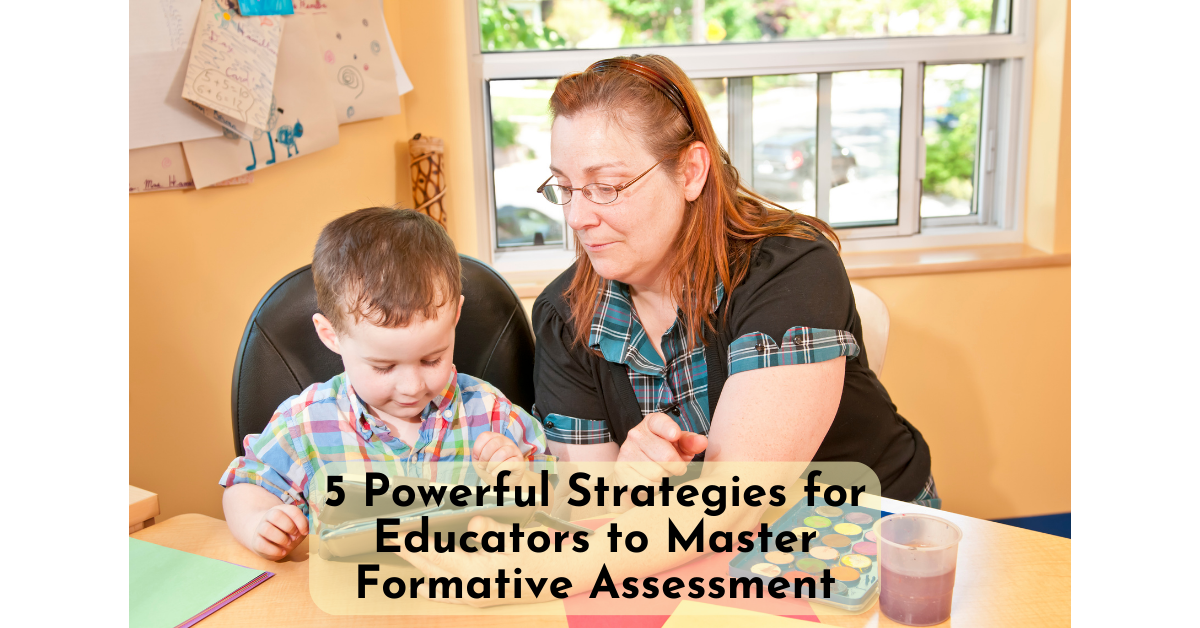Early childhood education plays a crucial role in nurturing young minds and preparing them for a successful future. It goes beyond basic care and supervision to provide intentional and structured educational experiences that promote cognitive, emotional, social, and physical development in children aged zero to six. Through age-appropriate activities such as language development, problem-solving skills, and social interactions, early childhood education creates a nurturing and stimulating environment that fosters learning and growth.
Research has consistently shown that children who receive quality early education are more likely to succeed academically and socially later in life. It lays the foundation for future learning and equips children with essential cognitive, emotional, social, and physical skills. Early childhood education also has psychological benefits, enhancing cognitive development, fostering emotional and social skills, promoting creativity and curiosity, and positively impacting mental health.
Investing in empowering early childhood education has long-term benefits that go beyond childhood. It influences academic, social, and emotional development in the future, creating a brighter future for our children and society as a whole.

Key Takeaways:
- Early childhood education provides intentional and structured educational experiences.
- It promotes cognitive, emotional, social, and physical development in young children.
- Children who receive quality early education are more likely to succeed academically and socially.
- Early childhood education has psychological benefits, enhancing cognitive development and promoting emotional and social skills.
- Investing in empowering early childhood education creates a brighter future for children and society.
Understanding Early Childhood Education
Early childhood education refers to intentional and structured educational experiences provided to children between the ages of zero and six, encompassing a variety of programs and curriculum. It goes beyond basic care and supervision to create a nurturing and stimulating environment that fosters learning and growth. The aim is to promote cognitive, emotional, social, and physical development through age-appropriate activities that support children’s overall development.
Research has consistently shown that children who receive quality early education are more likely to succeed academically and socially later in life. Early childhood education lays the foundation for future learning and equips children with essential cognitive, emotional, social, and physical skills. It offers educational benefits by building a strong foundation for academic success, fostering a love for learning, and nurturing creativity and curiosity. The long-term benefits of early childhood education go beyond childhood, influencing academic, social, and emotional development in the future.
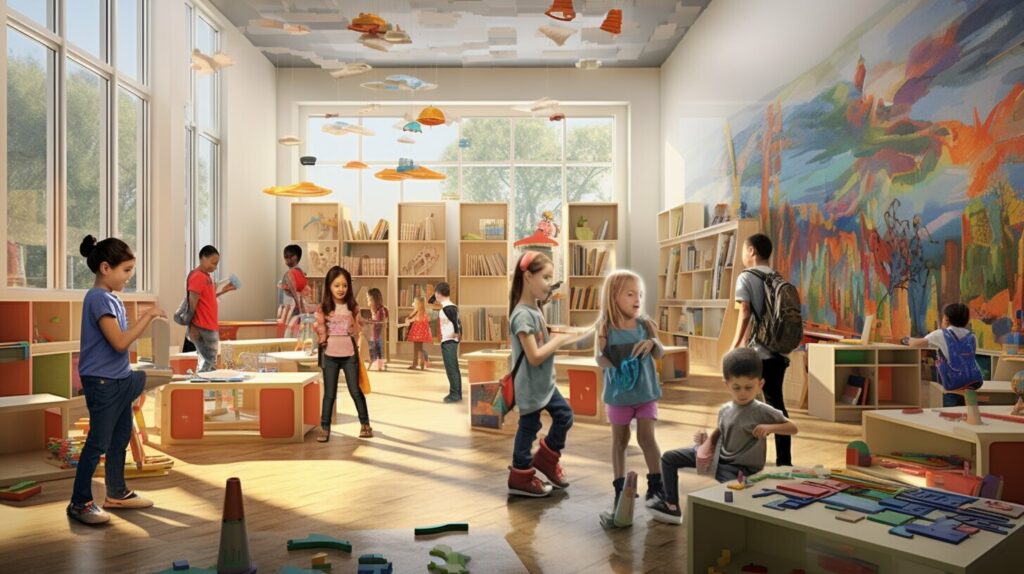
| Educational Programs | Preschool Curriculum |
|---|---|
| 1. Montessori | 1. Play-based approach |
| 2. Reggio Emilia | 2. Literacy and numeracy development |
| 3. Waldorf | 3. Social-emotional development |
| 4. HighScope | 4. Problem-solving and critical thinking skills |
Successful early childhood education programs utilize a range of educational programs and preschool curriculum tailored to children’s developmental needs. These programs, such as Montessori, Reggio Emilia, Waldorf, and HighScope, provide different approaches to learning and emphasize various aspects of children’s development. For example, Montessori education promotes independent learning and hands-on exploration, while Reggio Emilia emphasizes self-expression and creativity through art and project-based activities. Each program’s unique curriculum focuses on key areas such as play-based learning, social-emotional development, language and literacy skills, and problem-solving abilities, fostering a well-rounded educational experience for young learners.
The Benefits of Early Childhood Education
Early childhood education offers numerous benefits, such as fostering play-based learning and promoting the development of essential social-emotional, cognitive, and language skills. These benefits go beyond academic success, shaping children into confident, curious, and well-rounded individuals. Play-based learning, a key component of early childhood education, allows children to explore and discover the world around them through hands-on experiences, stimulating their imagination and creativity.
Research has shown that play-based learning not only enhances cognitive development but also nurtures problem-solving skills, critical thinking, and independent decision-making abilities. By engaging in interactive play, children develop social-emotional skills, such as empathy, cooperation, and self-regulation, which are crucial for building positive relationships and managing emotions effectively.
Furthermore, early childhood education emphasizes language development, laying the foundation for strong communication skills. Through age-appropriate activities, children acquire vocabulary, practice listening and speaking, and develop early reading and writing skills. This comprehensive language development encourages effective communication, enhances cognitive abilities, and supports future academic success.
| Benefits of Early Childhood Education: | |||
|---|---|---|---|
| Play-based learning | Social-emotional development | Cognitive development | Language development |
Early childhood education provides a nurturing environment where children can grow, explore, and learn through play. It offers a solid foundation for future learning, equipping children with essential skills for academic success, personal growth, and social engagement.
Investing in early childhood education sets the stage for lifelong learning, as the benefits extend far beyond the early years. Children who participate in quality early education programs are more likely to perform well in school, graduate from high school, and pursue higher education. They also have higher earning potential and better career prospects in adulthood.
By fostering play-based learning, supporting social-emotional development, nurturing cognitive abilities, and promoting language skills, early childhood education prepares children for the challenges and opportunities that lie ahead, empowering them to reach their full potential.
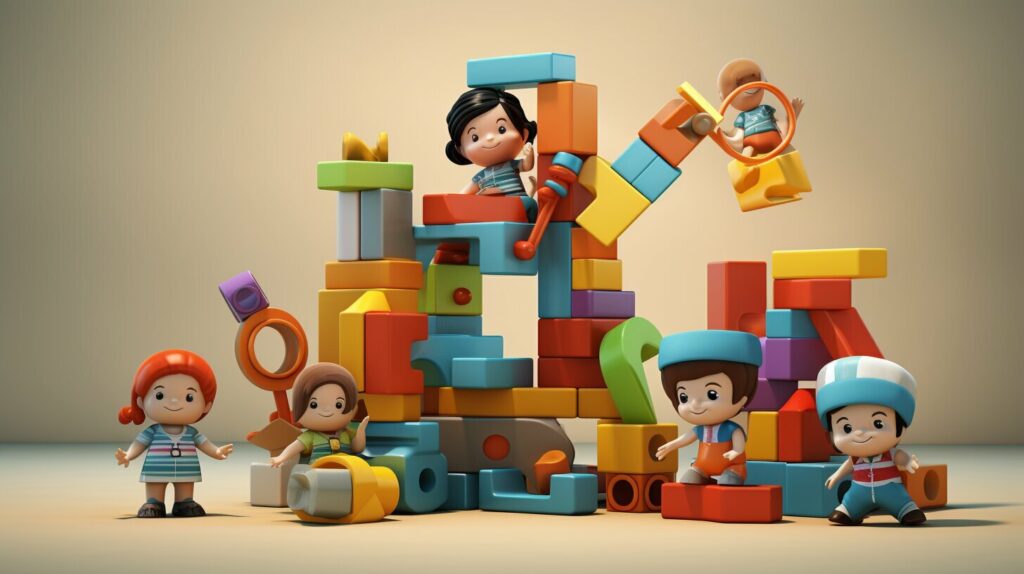
Building Early Literacy Skills
Early childhood education plays a crucial role in building strong early literacy skills through language development activities. These activities provide young children with the foundation they need to become proficient readers and communicators later in life. Research has shown that children who actively engage in language-rich environments and participate in language-focused activities during their early years are more likely to develop strong literacy skills.
Language development in early childhood education involves various strategies and techniques that encourage children to explore and express themselves through language. This includes storytelling, reading aloud, singing songs, playing word games, and engaging in conversations with peers and educators. These activities not only foster a love for language but also help children develop vocabulary, comprehension, phonological awareness, and grammar skills.

To support language development and literacy skills, early childhood educators create a print-rich environment. This includes displaying letters, words, and pictures in the classroom, providing access to a wide range of books and printed materials, and incorporating writing opportunities into various activities. By immersing children in a language-rich environment, educators ignite their curiosity and passion for reading and writing.
| Benefits of Building Early Literacy Skills |
|---|
| 1. Improved academic performance: Strong early literacy skills lay the foundation for academic success across all subjects. |
| 2. Enhanced communication skills: Early literacy skills enable children to express themselves effectively and confidently. |
| 3. Increased comprehension: Developing strong literacy skills enhances a child’s ability to understand and interpret information. |
| 4. Expanded vocabulary: Language development activities expose children to a wide range of words and help them build their vocabulary. |
| 5. Cultivated imagination: Reading and storytelling foster creativity and imagination in young learners. |
By prioritizing language development and early literacy skills, early childhood education sets children on a path towards lifelong learning. It equips them with the tools they need to succeed academically, communicate effectively, and fully engage in the world around them.
Parent Involvement in Early Childhood Education
Parent involvement is a key component of early childhood education, fostering a collaborative approach that enhances children’s learning and development. When parents are actively engaged in their child’s education, it creates a supportive and nurturing environment that promotes academic and social success. Research has shown that children with involved parents tend to perform better academically, have stronger social skills, and exhibit higher levels of self-esteem.
One way parents can get involved is by actively participating in their child’s educational experiences. This can include attending parent-teacher conferences, volunteering in the classroom, and joining parent committees or advisory boards. By doing so, parents can contribute to the decision-making process, provide valuable insights, and support the development and implementation of effective educational programs.
Another aspect of parent involvement in early childhood education is creating a home environment that supports learning. This can be achieved by providing educational materials, establishing routines, and engaging in activities that promote cognitive and language development. By fostering a love for learning, parents can instill a lifelong passion for education in their children.
To further enhance parent involvement, early childhood education programs can offer resources and workshops that educate parents on child development, effective parenting strategies, and ways to support their child’s learning at home. By equipping parents with the knowledge and tools they need, they can play an active role in their child’s education and contribute to their overall success.

The benefits of parent involvement in early childhood education are numerous. It promotes a strong parent-child bond, fosters open communication, and encourages collaboration between home and school. By working together, parents and educators can create a seamless learning experience that meets the unique needs and interests of each child.
“Parent involvement in early childhood education has been linked to positive outcomes such as increased school readiness, improved academic performance, and better social and emotional development.”
Furthermore, parent involvement helps create a sense of community within the early childhood education setting. By actively engaging parents, educators can build a network of support that extends beyond the classroom walls. This collaborative approach sets the foundation for a successful educational journey and empowers children to reach their full potential.
In conclusion, parent involvement plays a crucial role in early childhood education. It enhances children’s learning and development by fostering a collaborative approach, creating a supportive home environment, and promoting a strong parent-child relationship. By recognizing the importance of parent involvement and implementing strategies to encourage and support it, we can ensure that every child receives the best possible start in their educational journey.
Early Learning Programs and Resources
A wide range of early learning programs and resources, including reputable child care providers, contribute to a rich and holistic early childhood education experience. These programs are designed to provide young children with the necessary skills and knowledge to thrive academically, socially, and emotionally. Whether it’s a structured preschool curriculum, play-based learning programs, or specialized early intervention services, these resources play a crucial role in preparing children for future educational success.
One key aspect of early learning programs is the focus on age-appropriate activities that promote cognitive, emotional, and social development. These activities include language development exercises, problem-solving tasks, and interactive play, all of which help children expand their knowledge, enhance their critical thinking skills, and develop important social skills such as cooperation and communication.
Moreover, early education resources also provide opportunities for children to explore their creativity and curiosity. Through artistic activities, music and movement sessions, and sensory play, young learners can unleash their imagination and develop a love for learning. By encouraging curiosity and fostering a sense of wonder, these programs create a solid foundation for lifelong learning.
Inclusive Early Learning Environments
Inclusive early learning environments are essential for ensuring that all children, regardless of their abilities or backgrounds, have access to quality education. These environments embody principles of diversity, equity, and inclusion, and provide individualized support to meet the unique needs of each child. In an inclusive setting, children with disabilities or special needs are given the necessary accommodations and support to actively participate in the learning process alongside their peers.
Reputable child care providers play a crucial role in creating inclusive early learning environments. They employ trained and experienced educators who understand the importance of individualization and differentiation in the classroom. These educators use research-based approaches to curriculum design and implement strategies that cater to the diverse learning needs of their students.
By embracing inclusive practices, early learning programs and child care providers ensure that every child has an equal opportunity to learn, grow, and succeed. They foster an environment of acceptance, respect, and empathy, where children learn to appreciate and celebrate differences. In this way, inclusive early learning programs not only support children’s academic development but also promote social harmony and understanding at a young age.
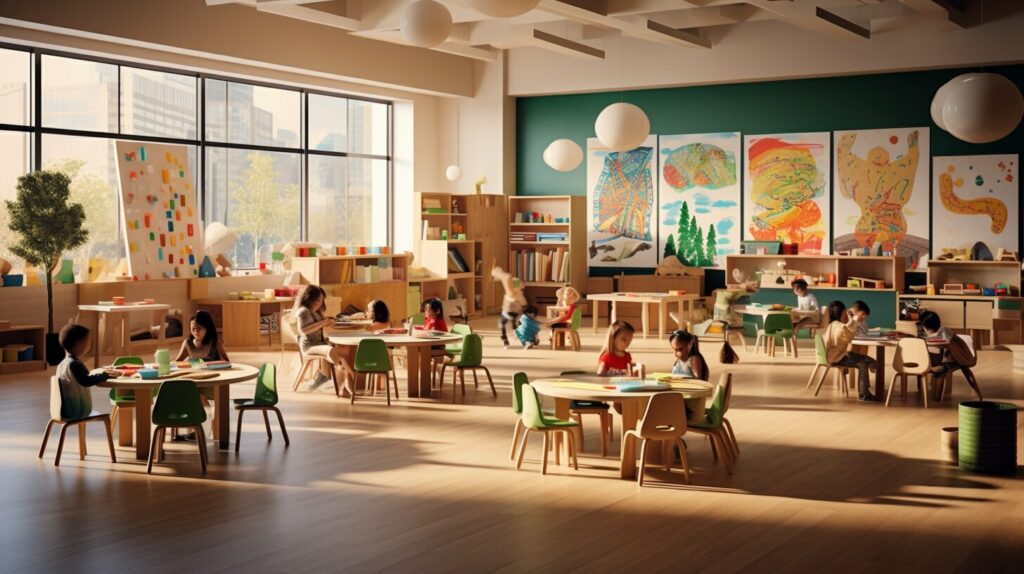
| Types of Early Learning Programs and Resources | Description |
|---|---|
| Preschool Curriculum | A structured curriculum designed to enhance children’s cognitive, social, and emotional development through age-appropriate activities and educational materials. |
| Play-Based Learning Programs | Programs that emphasize learning through play, allowing children to explore, experiment, and develop essential skills in a fun and engaging manner. |
| Early Intervention Services | Specialized programs that provide targeted support and services for children with developmental delays or disabilities, helping them reach their full potential. |
| Parent Education and Support | Resources and workshops that educate and empower parents to actively participate in their child’s early learning journey and provide support at home. |
| Community-Based Programs | Early learning programs offered by community organizations, libraries, and local educational institutions, creating accessible learning opportunities for all children. |
The Role of Early Childhood Educators
Early childhood educators play a crucial role in providing high-quality education and creating a nurturing environment for children’s growth and development. They are dedicated professionals who contribute significantly to the cognitive, emotional, social, and physical development of young learners. These educators are equipped with the knowledge and skills to design and implement age-appropriate activities that promote learning and encourage curiosity.
- They foster a love for learning and help children develop essential skills, such as language acquisition, problem-solving, and critical thinking.
- They create a supportive and inclusive environment that encourages children to explore, experiment, and express themselves creatively.
- They facilitate social interactions and teach children the values of empathy, cooperation, and respect.
- They assess children’s progress and adapt their teaching methods to meet individual needs, ensuring that every child has the opportunity to thrive.
Through their dedication, early childhood educators lay the foundation for future learning by instilling a love for education and fostering a positive attitude towards lifelong learning. They serve as mentors and role models, guiding children in their early years and setting them up for success in later stages of education.
“The true sign of intelligence is not knowledge but imagination.” – Albert Einstein
Early childhood educators understand the importance of imagination and its role in children’s learning and development. They foster creativity and curiosity, providing opportunities for children to explore their interests and ideas. By creating a safe and stimulating environment, they encourage children to think outside the box, ask questions, and discover the world around them.
It is essential to recognize and support the invaluable work of early childhood educators. Their passion, expertise, and commitment contribute significantly to the holistic development of children, shaping their academic success, social skills, emotional well-being, and overall growth.

| Qualities | Description |
|---|---|
| Patience | Ability to remain calm and understanding in challenging situations |
| Adaptability | Flexibility to meet the individual needs of diverse learners |
| Communication | Effective verbal and non-verbal communication skills to engage with children and parents |
| Passion | Genuine enthusiasm for teaching and a belief in the power of early childhood education |
| Continuous Learning | Commitment to professional development and staying updated on current research and practices |
| Empathy | Ability to understand and respond to the emotions and needs of children |
Kindergarten Readiness
Early childhood education plays a vital role in preparing children for a successful transition to kindergarten, ensuring they are ready to thrive academically and socially. Kindergarten readiness encompasses various developmental areas, including cognitive, social-emotional, language, and physical skills. By providing a strong foundation during the early years, children are better equipped to meet the challenges and expectations of formal schooling.

In order to promote kindergarten readiness, early childhood education programs focus on developing essential skills and competencies. These programs offer a holistic approach that combines structured learning experiences with play-based activities. Children engage in age-appropriate tasks and experiences that foster their cognitive development, problem-solving abilities, and language skills. They also have the opportunity to develop social-emotional skills through interactions with peers and educators, promoting self-regulation, empathy, and cooperation.
To support kindergarten readiness, early childhood educators employ research-based curriculum design and instructional strategies. They create a nurturing environment that encourages exploration, creativity, and curiosity. By fostering a love for learning at an early age, children develop a positive attitude towards education and become more motivated to engage in academic activities.
| Key Components of Kindergarten Readiness | Examples |
|---|---|
| Cognitive Skills | Counting objects, recognizing shapes, identifying letters and numbers |
| Social-Emotional Skills | Sharing, following directions, resolving conflicts |
| Language Development | Listening and speaking skills, vocabulary development, understanding basic grammar |
| Physical Skills | Gross motor skills (running, jumping), fine motor skills (holding a pencil, using scissors) |
By focusing on these key components of kindergarten readiness, early childhood education programs strive to ensure that children enter kindergarten with the necessary skills and knowledge to succeed. Through a combination of intentional teaching, hands-on experiences, and individualized instruction, these programs lay the foundation for a lifetime of learning and achievement.
Early childhood education plays a critical role in setting children up for success in kindergarten and beyond. By investing in high-quality early education opportunities, we can empower our future learners to reach their full potential academically, socially, and emotionally.
Early Intervention Programs
Early intervention programs are essential in supporting children’s early development and addressing potential challenges or delays that may arise. These programs focus on providing targeted interventions and support to children during the crucial early years of their lives, when their brains are rapidly developing and forming important neural connections.
Research has shown that early intervention can have a significant impact on a child’s future outcomes. By identifying and addressing developmental delays or disabilities early on, these programs help children overcome obstacles and reach their full potential. Early intervention programs encompass a range of services, including developmental screenings, therapies, and family support.
One of the key aspects of early intervention programs is their ability to provide individualized support to children and their families. These programs take into account the unique needs and strengths of each child, tailoring interventions to promote their overall development. Early intervention professionals, such as speech therapists, occupational therapists, and early childhood educators, work collaboratively with families to create an environment that encourages growth and learning.
By focusing on early childhood development, early intervention programs aim to address any areas of concern as early as possible. This proactive approach not only supports children’s immediate development but also helps to prevent potential difficulties from escalating in the future. Ultimately, early intervention programs play a crucial role in ensuring that all children have equal opportunities to thrive and succeed.
Benefits of Early Intervention Programs
| Benefits | Description |
|---|---|
| Improved Developmental Outcomes | Early intervention programs help children achieve optimal developmental milestones in areas such as language, motor skills, and social-emotional development. |
| Enhanced School Readiness | Children who receive early intervention are better prepared for school, as they have already received targeted support and interventions to address any developmental delays. |
| Positive Impact on Families | Early intervention programs provide families with the knowledge, resources, and support they need to navigate their child’s development and access the necessary services and resources. |
| Long-Term Cost Savings | Investing in early intervention programs can lead to significant cost savings in the long run, as addressing developmental delays early on reduces the need for more intensive interventions or support services later in life. |
Early intervention programs are a critical component of ensuring that all children have an equal opportunity to reach their full potential. By providing targeted support and interventions during the early years, these programs lay the foundation for lifelong success and well-being.
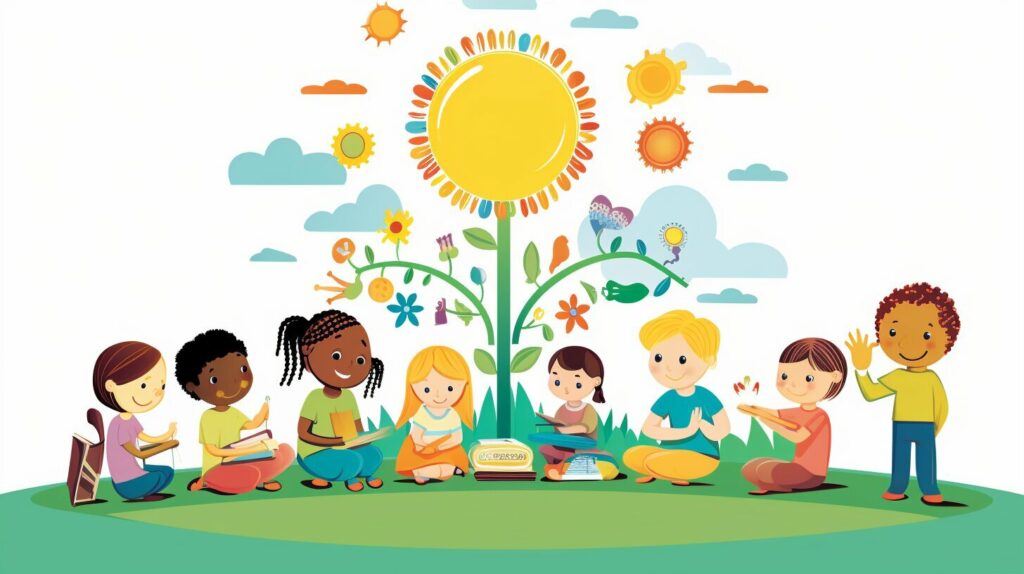
Overcoming Challenges in Early Childhood Education
Early childhood education faces various challenges, but strategies such as sensory learning and fostering social-emotional skills can help overcome them. One of the main challenges is engaging children who may have different learning styles or attention spans. Sensory learning, which involves using hands-on activities and stimulating the senses, can be highly effective in capturing children’s interest and promoting active learning. By incorporating sensory elements such as touch, smell, and sight into educational activities, educators can create a dynamic and engaging learning environment.
Fostering social-emotional skills is another crucial aspect of overcoming challenges in early childhood education. Young children are still developing their emotional regulation and social interaction skills, which can sometimes lead to conflicts or difficulties in expressing themselves. By providing opportunities for children to engage in positive social interactions, collaborate with peers, and express their emotions in a safe and supportive environment, educators can help children build strong social-emotional foundations.
Implementing strategies that prioritize both sensory learning and social-emotional skill development can create a balanced and inclusive early childhood education experience. It is important for educators and caregivers to adapt their approaches to meet the individual needs of each child and provide personalized support. By recognizing and addressing the challenges faced in early childhood education, we can create a nurturing and empowering environment that sets children up for lifelong success.

| Challenges in Early Childhood Education | Strategies to Overcome |
|---|---|
| Engaging children with different learning styles and attention spans | Implement sensory learning approaches and hands-on activities |
| Developing social-emotional skills and managing conflicts | Foster a supportive environment for positive social interactions |
| Adapting to individual needs and providing personalized support | Recognize and address the unique challenges faced by each child |
Creating a Supportive Environment for Early Education
Creating a supportive environment that values early education, promotes school readiness, and prioritizes holistic child development is crucial for the success of early childhood education. When children are surrounded by a nurturing and stimulating atmosphere, they are more likely to thrive academically, socially, and emotionally.
One way to foster a supportive environment is by ensuring that early education programs prioritize school readiness. These programs should focus on developing essential skills and knowledge that prepare children for the transition to formal schooling. By introducing age-appropriate activities that promote language and literacy development, problem-solving skills, and early math concepts, children are better equipped to succeed in kindergarten and beyond.
A supportive environment for early education also recognizes the importance of holistic child development. This means valuing and addressing the physical, emotional, social, and cognitive needs of young learners. Incorporating play-based learning activities, arts and crafts, music, and movement into the curriculum can foster creativity, curiosity, and overall well-being. Moreover, creating opportunities for social interactions, collaboration, and friendship-building helps children develop crucial social-emotional skills that are essential for lifelong success.
| Benefits of a Supportive Environment for Early Education: |
|---|
| Enhanced school readiness |
| Positive impact on cognitive, emotional, and social development |
| Fosters a love for learning and curiosity |
| Promotes creativity and imagination |
| Develops social-emotional skills |
In conclusion, creating a supportive environment that values early education, promotes school readiness, and prioritizes holistic child development is pivotal for the success of early childhood education. By providing children with a nurturing and stimulating environment, we set them on a path towards academic achievement, emotional well-being, and a love for lifelong learning.

By investing in empowering early childhood education, we lay the foundation for future generations, fostering early literacy, social-emotional skills, school readiness, and overall child development. Early childhood training refers to intentional and structured educational experiences provided to young children, typically between the ages of zero and six. It goes beyond basic care and supervision to create a nurturing and stimulating environment that fosters learning and growth.
Research consistently shows that children who receive quality early education are more likely to succeed academically and socially later in life. Early childhood training promotes cognitive, emotional, social, and physical development through age-appropriate activities such as language development, problem-solving skills, and social interactions. It lays the groundwork for future learning and equips children with essential cognitive, emotional, social, and physical skills.
High-quality early childhood training also has psychological benefits, enhancing cognitive development, fostering emotional and social skills, promoting creativity and curiosity, and positively impacting mental health. It offers educational benefits by building a strong foundation for academic success, fostering a love for learning, and nurturing creativity and curiosity. The long-term benefits of early childhood training go beyond childhood, influencing academic, social, and emotional development in the future.
To create high-quality early childcare and education programs, it is important to understand early childhood development, use research-based approaches to curriculum design, foster a nurturing environment, engage parents and the community, provide individualized learning and inclusivity, use technology wisely, offer continuous professional development for educators, assess and measure impact, and overcome challenges and obstacles. Successful early childcare and education programs serve as case studies for inspiration and adaptation of best practices. Advocacy and policy recommendations are essential for creating a supportive environment for early education.
By investing in empowering early childhood education, we equip future learners with the tools they need to succeed academically, socially, and emotionally and create a brighter future for our children and society as a whole.
FAQ
Q: What is early childhood training?
A: Early childhood training refers to intentional and structured educational experiences provided to young children, typically between the ages of zero and six. It goes beyond basic care and supervision to create a nurturing and stimulating environment that fosters learning and growth.
Q: What are the benefits of early childhood training?
A: Research has consistently shown that children who receive quality early education are more likely to succeed academically and socially later in life. It lays the foundation for future learning and equips children with essential cognitive, emotional, social, and physical skills.
Q: How does early childhood training impact development?
A: Early childhood training has psychological benefits, enhancing cognitive development, fostering emotional and social skills, promoting creativity and curiosity, and positively impacting mental health. It also offers educational benefits by building a strong foundation for academic success, fostering a love for learning, and nurturing creativity and curiosity.
Q: What are the long-term benefits of early childhood training?
A: The long-term benefits of early childhood training go beyond childhood, influencing academic, social, and emotional development in the future.
Q: How can high-quality early childcare and education programs be created?
A: To create high-quality early childcare and education programs, it is important to understand early childhood development, use research-based approaches to curriculum design, foster a nurturing environment, engage parents and the community, provide individualized learning and inclusivity, use technology wisely, offer continuous professional development for educators, assess and measure impact, and overcome challenges and obstacles.
Q: What is the role of early childhood educators?
A: Early childhood educators play a vital role in delivering high-quality education and supporting children’s development.
Q: How does early childhood education support kindergarten readiness?
A: Early childhood education prepares children for a smooth transition to kindergarten by building essential skills and promoting school readiness.
Q: What are early intervention programs?
A: Early intervention programs are designed to support children’s early childhood development by addressing potential challenges or delays.
Q: What are some challenges in early childhood education and how can they be overcome?
A: Challenges in early childhood education include sensory learning difficulties and fostering social-emotional skills. Strategies for overcoming these challenges include implementing sensory learning approaches and creating a nurturing environment that supports social-emotional development.
Q: How can a supportive environment for early education be created?
A: Creating a supportive environment for early education involves prioritizing school readiness, early childhood development, and preschool education to ensure holistic development of young children.
Source Links
- https://www.graygroupintl.com/blog/early-childhood-training
- https://cornerstone.lib.mnsu.edu/university-archives-msu-authors/175/
- https://medium.com/@websitemj/creating-impactful-early-childcare-education-programs-empowering-the-future-generation-ae79b9e7130c
Download free activities and teaching resources Click Here
You may also be interested in
Formative Assessment Mastery: 5 Essential Strategies Empowering Educators
The Ultimate Guide to Addition Worksheets: Boosting Math Skills
Debunking 10 Powerful Myths: The Truth About Differentiated Instruction

